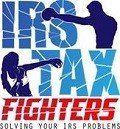Corporate IRS Tax Specialists
IRS Tax Fighters
specializes in corporate tax resolutions. Our firm has decades of experience providing relief and results for businesses Nationwide. We strive to be your aggressive protector, ready to go to battle when you need us most. As a self-started company we understand how important these cases are to you, your assets, your company, and your family. Allow us to protect it for you. Call our Houston, Texas
based office at 281-962-0070
to schedule a free consultation.
Unfiled Tax Returns
It is very important to file all returns. We prepare the following individual, business and estate tax returns for current years and back tax years:
- Form 1120 Corporation income tax return
- Form 1120S S Corporation income tax return
- Form 1065 Partnership income tax return
- Form 1041 Estate and trust income tax return
- Form 990 Nonprofit tax return
- Form 941 Quarterly payroll tax return
- Form 940 Annual Federal Unemployment tax return
Bank & Accounts Receivable Levy Release
A levy is a legal seizure of your property to satisfy a debt. The IRS can garnish wages, take money in your bank or other financial account, seize and sell your vehicle, real estate, business and other personal property. The most common types of levies are bank levies and accounts receivable levies.
Prior to getting a levy the IRS is required to give you notice of their intent to levy. Normally, this is done by sending out letters such as a CP503B, CP504B, Letter 1058, LT11. You can identify each letter by looking at the top right corner of the letter, except for the letter 1058. The code for the 1058 is in the bottom right corner of the letter. If you have received any of these letters it is best to not delay. Call IRS Tax Fighters now at 1-888-959-2671.
Installment Agreement
An installment agreement is a monthly payment plan set up to pay a tax debt over time. It is important to get help setting up a payment amount that is low enough to allow you to “live” and pay the IRS. Some payment amounts are so high that it’s difficult for you to “breathe” and “live”.
Payroll Tax Negotiation
Business owners who have employees are required to make payroll tax deposits. Owing for past due payroll tax deposits can be very stressful because the IRS is very aggressive in their attempts to collect, and it takes considerable time and energy to keep the business operating. It is important to find someone to represent you that can negotiate with the IRS very well, but that also knows about accounting and running a business so that they can also give you advice on changes that you can make to make it easier to meet your future payroll tax obligations.
Revenue Officer Negotiation
A revenue officer (RO) is an individual IRS agent that is personally assigned to collect your debt. They will personally visit your home or place of business. They will give you a business card with their contact information. They are generally nice people. The problem is that they can be nice one week and levy you two weeks later. They are very aggressive and it is best to get good representation when you have a Revenue Officer.
Audit Representation
There are three types of audits: a correspondence audit, an office audit and a field audit. A correspondence audit is simply a letter from the IRS indicating that they are questioning something on a tax return you filed and are proposing a change to your tax return. An office audit is completed by an IRS Revenue Agent at the Revenue Agent’s office. A field audit is conducted at your home, place of business or accountant’s office. Office and field audits are generally more detailed audits. The most common audits are correspondence and office audits. A correspondence audit can be something simple like an addition error on your tax return or something more complex like Earned Income Credit. It is important to get good representation to help with office audits, field audits and many correspondence audits.
Uncollectable Status
Uncollectible status is also called Currently not Collectible status or CNC status. It is a program offered by the IRS where the IRS decides that you do not have the ability to pay anything monthly towards your debt, and therefore the IRS stops aggressive collection procedures towards you. The debt is still owed and reminder of balance due letters are occasionally mailed, but nothing else. This is a good option for some people who may not qualify for an offer in compromise.







